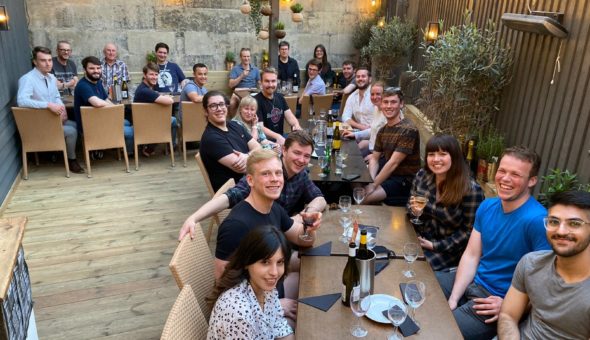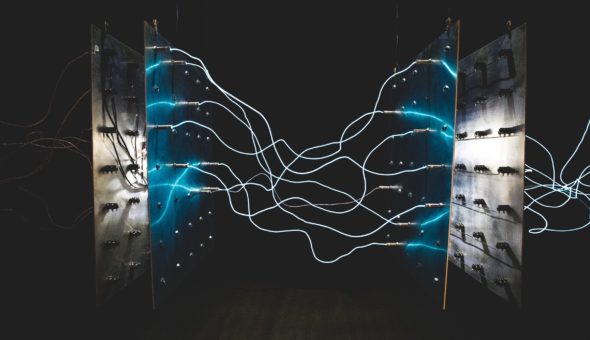The third AAPS CDT Integrative Think Tank (ITT3) took place from the 18th to 22nd January 2021. The ITTs are part of our evaluation for the Student-Led Symposium module which integrates our MRes year, as cohort 2 students.
ITTs are ‘big events’, focal points in the AAPS CDT calendar of activity, and central to its goals. ITTs are facilitated workshops in which academic, industrial, and other external partners present problems requiring research solutions, with lectures on relevant background given by experts. Students are expected to define routes to the solution of these problems, identifying the new research that will be necessary to make this possible.
Given the current pandemic situation, this third edition of the ITT took place in a virtual environment. However, the flawless organisation of the Management Team paired with the use of platforms such as Microsoft Teams and Gather.Town, made it possible to achieve a good level of immersion for everyone when attending the numerous activities prepared. These included not only the conferences and team meetings happening during the day but also a variety of leisure activities organised for the participants to socialise and decompress in the evenings, ranging from a movie night based around the Cybersecurity Theme, to a virtual around the world globe trotting activity, to an end of week wine and cheese tasting celebration (thanks to Wolf Wine, Bath), there was also a daily stretching session available to those who wanted to join.
This ITT was provided in partnership with Horiba Mira and was dedicated to the vast and rapidly emerging subject of cybersecurity, not only in the automotive industry but in inherent fields such as transport infrastructure, policy, and data management. The key topics included
- Rapid technology advances in the automotive industry are seeing innovations in connectivity with vehicles, other devices, cloud storage & infrastructure.
- Smart cities are relying on real-time data to create integrated transport systems incorporating Mobility as a Service (MaaS), Advanced Traffic Management Systems, Smart Parking and Bicycle sharing.
- Modern vehicles are being equipped with Internet of Things (IoT) devices that transform them into sensors feeding data the city’s traffic management systems and to the driver.
- Electronic components in the engine, transmission and chassis alongside those associated with driver assistance, passenger comfort and entertainment systems is also increasing the network connectivity between the systems.
- The consequence of this increase in connectivity, data and electronic components in vehicles, manufacturing and the wider environment is the growing and significant cyber-threat.
There were approximately 70 people that attended ITT3, including representatives from Horiba-Mira, AAPS Cohort 1 and 2 students, ART-AI and TIPS CDT students, academics from across the University of Bath and guests from the University of Bristol.

18th January
The first day consisted of presentations from Horiba Mira representatives, setting out the high-level challenges for the rest of the week, and included two breakout sessions where various groups had to generate ideas on the covered topics. At the end of the day all the gathered ideas were grouped in 5 clusters (Code of Conduct, Product Lifecycle, Quantifying Complexity and Vulnerability, Addressing Competition, and User and Usage Impacts) defining the working teams for the remaining week. These teams were generally formed with a mixture of students from cohort 2, some members from cohort 1 and IAAPS researchers and academics.
19th to 21st January
The following 3 days were mostly spent around the formulation of a research question related to the area defined by the group, while also having Guest Lectures for support. These were the more exciting and challenging days of the ITT, during which a multitude of different ideas was generated to result in a research question. Throughout the day we were offered as much support as needed with a lot of industry experts and academics going from virtual room to virtual room to check in on us and contribute to the ongoing ideating process.
22nd Friday
The last day can be the most stressful. It is, after all, the culmination of all the hard work we have been doing for the past week. The whole day consisted of a 30 min presentation per cluster/group where the research questions were presented (mostly by cohort 2 students) as well as a brief structure for tackling them.

Overall, the ITTs are an excellent way to gather knowledge and explore the unanswered questions that remain in a specific research area. In my experience, these ITTs are an excellent example of how far a transdisciplinary response to a multitude of problems can go, and how big a difference it can make. The challenge here is not about trying to know everything about these areas, but instead, trying to learn and contribute within your (sometimes) unique research area and perspective for solving these questions.
We are looking forward to ITT4 already, which will take place in June.

Respond


